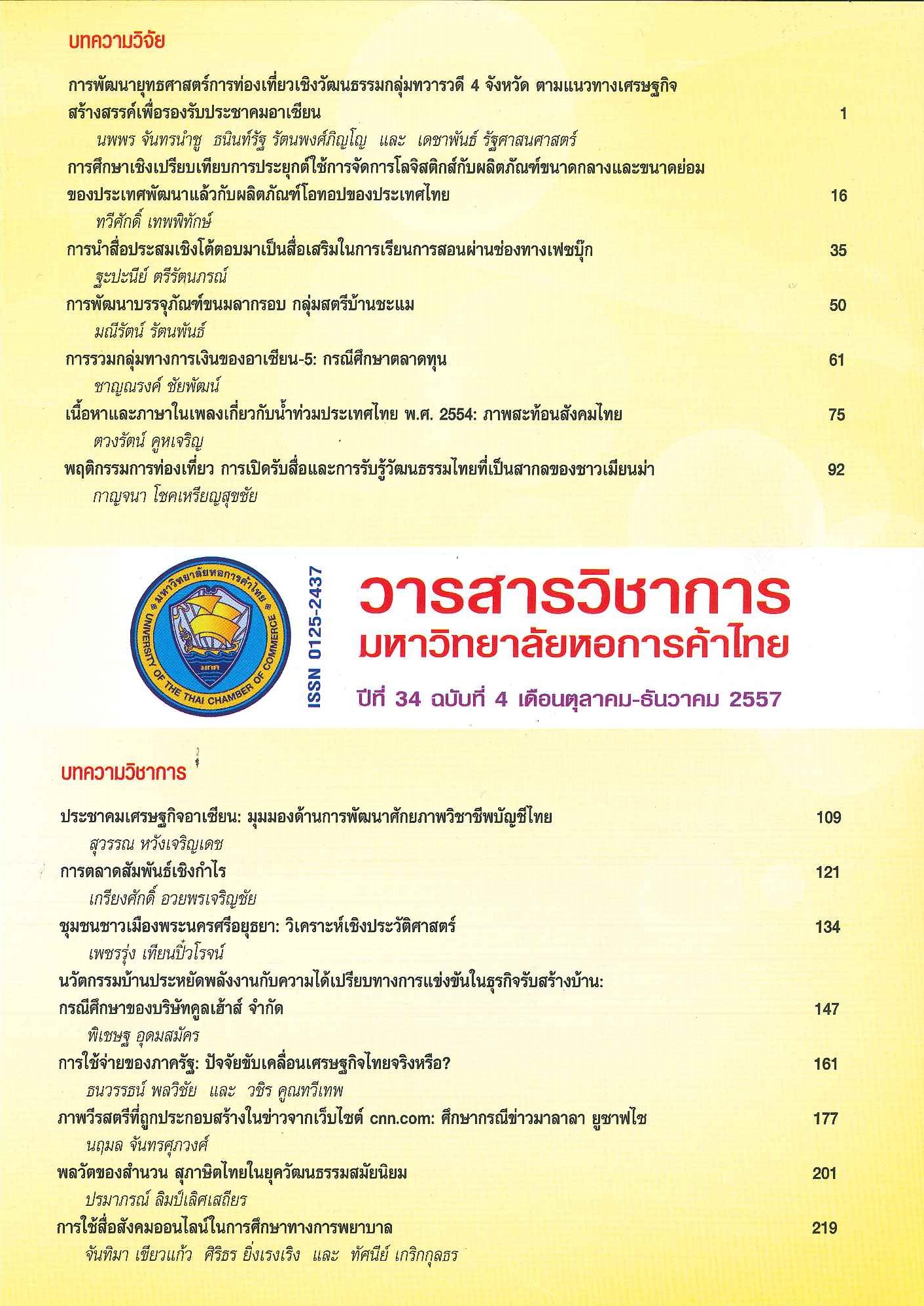The Dynamic of Idioms and Thai Proverbs in the Popular Culture Period
Main Article Content
Abstract
This article focuses on the study of modernized Thai idioms and proverbs on the Internet that have been changed by the attitude of society at the present time. The important factors that cause Thai proverbs to be changed originate from the government sector that would like to change the meaning of the proverb “Spare the rod, spoil the child” in Thai. This proverb means “if you love your children, punish them when they do things wrong”. The government sector would like to adapt the meaning to “if you love your children, hug them”. Consequently, people in the online society create a trend of adapting Thai proverbs on Twitter under the tag “adapting proverbs for a better society” by adding words, eliminating words or adding new sentences at the end of those idioms and proverbs. The purpose is to be sarcastic, or parodying politics, society, and celebrities. Most meanings of these adapted Thai idioms and proverbs are to create a sense of humor for readers. However, if we consider the social contexts, we find that these Thai idioms and proverbs reflect much on the popular culture, such as, consumerism, alternative sexuality, beauty worship, the popularity of cross cultural assimilation, and the popularity of the usage of modernized communication technology. A short trend of this phenomenon of playing with language, however, does not change the original meaning of Thai idioms and proverbs. They reflect that the new generation can creatively apply popular culture and globalization trends to the culture of language.
Article Details

This work is licensed under a Creative Commons Attribution-NonCommercial-NoDerivatives 4.0 International License.
ลิขสิทธิ์ของบทความ
ผลงานที่ได้รับการตีพิมพ์ถือเป็นลิขสิทธิ์ของมหาวิทยาลัยหอการค้าไทย ห้ามมิให้นำเนื้อหา ทัศนะ หรือข้อคิดเห็นใด ๆ ของผลงานไปทำซ้ำ ดัดแปลง หรือเผยแพร่ ไม่ว่าทั้งหมดหรือบางส่วนโดยไม่ได้รับอนุญาตเป็นลายลักษณ์อักษรจากมหาวิทยาลัยหอการค้าไทยก่อน
References
กฤตยา อาชวนิจกุล. 2554. เพศวิถีที่กำลังเปลี่ยนแปลงไปในสังคมไทย. นครปฐม: สถาบันวิจัยประชากรและสังคม มหาวิทยาลัยมหิดล.
Boonyakiat, Chewasit. 2006. “The Advertisement of Products and Services for Beauty Message Medium Significance and Meaning.” The Princess Maha Chakri Sirindhorn
Anthropology Centre (public organization) 42, 8: 1-65. (in Thai).
ชีวสิทธิ์ บุณยเกียรติ. 2549. “โฆษณาสินค้าและบริการเพื่อความงาม สาร สื่อ นัยและความหมาย.” วารสารวิชาการ ศูนย์มานุษยวิทยาสิรินธร (องค์การมหาชน) 42, 8: 1-65.
Chaiworrapond, Sart. 2009. “Post Modern Idea and the Study of International Relations by Richard K. Ashley.” Rattasartsarn Journal 30,1: 58-112. (in Thai).
ศาสตร์ ชัยวรพร. 2552. “แนวคิดหลังสมัยใหม่กับการศึกษาความสัมพันธ์ระหว่างประเทศ: ศึกษางาน ของ ริชาร์ด เค แอชลีย.” รัฐศาสตร์สาร 30, 1: 58-112.
Charernsin-olan, Chaiyarat. 2000. Discourse Development: Power Knowledge Truth Uniqueness and Otherness. 2 nd ed. Bangkok: Wipasa Press. (in Thai).
ไชยรัตน์ เจริญสินโอฬาร. 2543. วาทกรรมการพัฒนา: อำนาจ ความรู้ ความจริง เอกลักษณ์ และความเป็นอื่น. พิมพ์ครั้งที่ 2. กรุงเทพมหานคร: วิภาษา.
Chiwapan, Atchara. 2004. Pasapasorn: Interesting Knowledge for Thai Language Instructors. Bangkok: Chulalongkorn University Press. (in Thai).
อัจฉรา ชีวพันธ์. 2547. ภาษาพาสอน เรื่องน่ารู้สำหรับครูภาษาไทย. กรุงเทพมหานคร: สำนักพิมพ์แห่งจุฬาลงกรณ์มหาวิทยาลัย.
Duangwisate, Narupon. 2012. “The Study of Gay in Thai Society Five Decades of Knowledge Building.” Sexuality Studies Journal 2, 2: 141-155. (in Thai).
นฤพนธ์ ด้วงวิเศษ. 2555. “การศึกษาเกย์ในสังคมไทย 5 ทศวรรษของการสร้างความรู้.” วารสารเพศ วิถีศึกษา 2, 2: 141-155.
Hongsladaromp, Krissadawan, and Iamanon, Janthima. 2006. Studies Society Through Discourse. Bangkok: Chulalongkorn University Press. (in Thai).
กฤษดาวรรณ หงศ์ลดารมภ์ และจันทิมา เอียมานนท์. 2549. มองสังคมผ่านวาทกรรม. กรุงเทพมหานคร: สำนักพิมพ์แห่งจุฬาลงกรณ์มหาวิทยาลัย.
Kitiarsa, Pattana. 2003. Pop Culture Man: Thai in Popular Culture. Bangkok: The Princess Maha Chakri Sirindhorn Anthropology Centre (public organization). (in Thai).
พัฒนา กิติอาษา. 2546. คนพันธุ์ป๊อป: ตัวตนคนไทยในวัฒนธรรมสมัยนิยม. กรุงเทพมหานคร: ศูนย์มานุษยวิทยาสิรินธร (องค์การมหาชน).
Mahidol University. Research Institute for Languages and Cultures of Asia. 2014. Popular Culture. Supplementary Sheet for National Academic Seminar 28 July 2557 at
Language and Culture Building Research Institute for Languages and Cultures of Asia Mahidol University Salaya. (in Thai).
มหาวิทยาลัยมหิดล. สถาบันวิจัยภาษาและวัฒนธรรมเอเชีย. 2557. วัฒนธรรมสมัยนิยม. เอกสารการประกอบการสัมมนาทางวิชาการระดับชาติ 28 กรกฎาคม 2557 ณ อาคารภาษาและวัฒนธรรมสยามบรมราชกุมาริ สถาบันวิจัยภาษาและวัฒนธรรมเอเชีย มหาวิทยาลัยมหิดล ศาลายา.
Naksakul, Kanjana. 2002. Norm of Thai Language. Vol 1. Bangkok: Thai Language Institution, Department of Curriculum and Instruction Development, Ministry of
Education. (in Thai).
กาญจนา นาคสกุล. 2545. บรรทัดฐานภาษาไทย. เล่ม 1. กรุงเทพมหานคร: สถาบันภาษาไทย กรมวิชาการ กระทรวงศึกษาธิการ.
Nathalang, Siraporn. 2005. Theory of Folklore: Study of Mythology and Folktale. Bangkok: Academic Paper Dissemination Project, Faculty of Arts, Chulalongkorn University.
(in Thai).
ศิราพร ณ ถลาง. 2548. ทฤษฎีคติชนวิทยาวิธีวิทยาในการวิเคราะห์ ตำนาน – นิทานพื้นบ้าน. กรุงเทพมหานคร: โครงการเผยแพร่ผลงานทางวิชาการคณะอักษรศาสตร์ จุฬาลงกรณ์มหาวิทยาลัย.
New Trend: Internet Searcher Adapt Proverbs and Post on Twitter [Online]. 2013. Available: http://hilight.kapook.com/view/75605 (in Thai).
เทรนด์ใหม่ชาวเน็ต แปลงสุภาษิต (ฮา) โพสต์ลงทวิตเตอร์ [ออนไลน์]. 2556. เข้าถึงจาก:http://hilight.kapook.com/view/75605
Nutpiem, Theera. 1998. Post Modern Politics. Khanlongthai II. Bangkok: Silsiam Packaging and Press. (in Thai).
ธีระ นุชเปี่ยม. 2541. การเมืองโลกหลังสมัยใหม่. ชุดครรลองไทย. เล่มที่ 2. กรุงเทพมหานคร: ศิลป์สยามบรรจุภัณฑ์และการพิมพ์.
Padungchewit, Juthapat. 2007. Culture, Communication, and Identity. Bangkok: Chulalongkorn University Press. (in Thai).
จุฑาพรรธ์ (จามจุรี) ผดุงชีวิต. 2550. วัฒนธรรม การสื่อสาร และอัตลักษณ์. กรุงเทพมหานคร: สำนักพิมพ์แห่งจุฬาลงกรณ์มหาวิทยาลัย.
Poll Shows that Society Accept Transgender and Support to Register a Marriage Certificate [Online]. Available: http://www.thairat.co.th/content/edu/345365 (in Thai).
โพลชี้สังคมเปิดใจรับเพศที่สาม หนุนจดเบียนสมรส [ออนไลน์]. เข้าถึงจาก: http://www.thairath.co.th/content/edu/345365
Pondsakulwanit, Wikanda. 2007. “Incentive and Behavior in Internet Searching of Thai Youth.” Academic Journal University of the Thai Chamber of Commerce 27, 2: 29-37. (in Thai).
วิกานดา พรสกุลวานิช. 2550. “แรงจูงใจและพฤติกรรมการใช้อินเทอร์เน็ตของเยาวชนไทย” วารสารวิชาการมหาวิทยาลัยหอการค้าไทย 27, 2: 29-37.
Pramoj Na Ayudhaya, Khaisiri. 1983. The Change of Words and the Meaning of Thai Proverbs. Bangkok: Chulalongkorn University Press. (in Thai).
ไขสิริ ปราโมช ณ อยุธยา. 2526. การเปลี่ยนแปลงถ้อยคำและความหมายของสำนวนไทย. กรุงเทพมหานคร: สำนักพิมพ์แห่งจุฬาลงกรณ์มหาวิทยาลัย.
Ratanasaeng, Boonkerd. 1993. Local Literature. Bangkok: Odient Store. (in Thai).
บุญเกิด รัตนแสง. 2536. วรรณกรรมท้องถิ่น. กรุงเทพมหานคร: โอเดียนสโตร์.
Sewikool, Prapassorn. 2013. Consumption Culture and Culture Consumption [Online]. Available: http://www.komchadluek.net/detail/20121226/148066 (in Thai).
ประภัสสร เสวิกุล. 2556. วัฒนธรรมการบริโภคกับการบริโภควัฒนธรรม [ออนไลน์]. เข้าถึงจาก:http://www.komchadluek.net/detail/20121226/148066
Siriyuvasak, Ubolrat, ed. 2007. Introduction to Mass Communication: Media, Culture and Society. 2 nd ed. Bangkok: Chulalongkorn University Press. (in Thai).
อุบลรัตน์ ศิริยุวศักดิ์, บรรณาธิการ. 2550. สื่อสารมวลชนเบื้องต้น สื่อมวลชน วัฒนธรรมและสังคม. พิมพ์ครั้งที่ 2. กรุงเทพมหานคร: สำนักพิมพ์จุฬาลงกรณ์มหาวิทยาลัย.
Supasit Thai Tae Kae Guan Guan [Online]. 2013. Available: http://www.okanation.net/blog/print.php?id=533088 (in Thai).
สุภาษิตไทยแท้แค่กวน กวน [ออนไลน์]. 2556. เข้าถึงจาก: http://www.oknation.net /blog/print.php?id=533088


